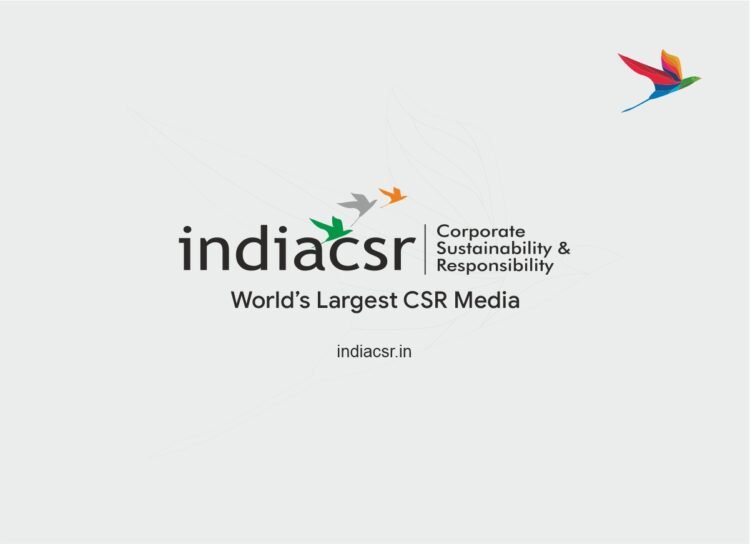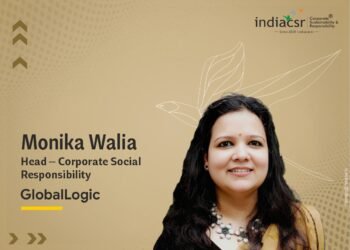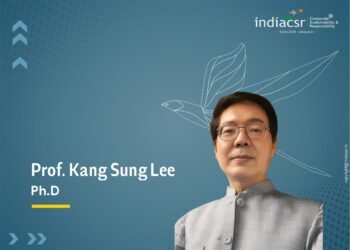NEW DELHI (IndiaCSR): Indus Towers, a telecom tower company, recently launched the third edition of its annual Sustainability Report for the year 2015-16. The report showcases Indus Towers’ commitment towards protecting the environment, enhancing engagement with communities, while continuing to create value for all its stakeholders in a sustainable manner. In an exclusive interview with India CSR Network, Manoj Kumar Singh, Chief of Regulatory Affairs, Sustainability & CSR, IndusTowers discuss the sustainability report of IndusTowers, vision of Sustainability and recent development. Edited excerpts:
What was the reason behind the inception of the sustainability report? In the third year, how far do you think you have come?
As India’s largest telecom infrastructure company, we feel that it is our responsibility to transparently talk about our sustainability initiatives with our stakeholders. The transformational impact of our operations on the telecommunications industry makes it all the more important for us to see our business through the sustainability lens. Touching 600 million people every day and living up to our commitment of ‘Putting India First’, the sustainability objective of the organization becomes an important aspect. Our commitment to continuously innovate and enhance operational efficiencies has resulted in uninterrupted service delivery and substantial cost savings for our customers. We believe that this report will help us showcase our focus and perspective on the importance that sustainability holds within every function of this company, be it CSR, customer service or enabling our employees.
As a nine-year old organisation, we feel that our journey has just begun. From a start-up to becoming India’s largest telecom tower company – we have always seen ourselves as an organisation whose success directly contributes to nation-building by connecting people.
How does Indus Towers perceive sustainability as a key organisational value?
Our core values drive sustainability across our business and serve as a guiding tool for ingraining sustainability in our day-today operations. From its inception in 2007, Indus Towers has taken on the challenge of adopting principles of sustainability across its operations. Be it our numerous initiatives for managing energy at our towers, our corporate social responsibility programme or our massive drive to up-skill our on-site workforce, sustainability is a part of everything we do.
We are a driven entrepreneurial and innovative organisation committed towards growing our business in a sustainable manner, while remaining accountable to all our stakeholders. Our ExCITE (Excellence, Customer, Integrity, Teamwork, Environment) values define the way we work and the way we maintain relationships with all our stakeholders. Our values ensure that we deliver best-in class, reliable and high quality services to our customers, conduct our business with the utmost integrity, encourage innovation and collaboration across functions, protect the environment, and be socially responsible.
What are your goals with respect to sustainability initiatives? How much have you accomplished?
Our vision for sustainability has been in line with the purpose of the telecom industry announced at the Mobile World Congress (MWC) 2016 in Barcelona – “Connecting Everyone and Everything to a Better Future”. This sums up the role we will play in achieving the sustainable development goals. We endeavour to integrate our focus on innovation and sustainability through our business operations and work towards it with all our stakeholders. Taking cue from that, we have been able to expand from over 35,000 green sites in 2013-14 to 50,461 green sites in 2015-16, contributing to 44 per cent growth in green sites for the company. Over 13,990 of our sites have been converted from indoor to outdoor. Deployment of solar solutions at 1000+ sites to reduce CO2 footprint and reduction in consumption of diesel by 10.39% has led to 40,955 kg/annum reduced CO2 emissions. For us, this is just the beginning of our sustainability journey, we will have many milestones to achieve as we embark on this journey together with our stakeholders.
Any milestone/positive change witnessed in comparison to the last sustainability report that you would like to highlight?
Since the inception of our sustainability journey, we are continuously switching the power source from diesel to grid electricity and making the sites diesel free. In the journey towards providing green telecommunication, this year, we achieved the milestone of crossing 50,000 diesel-free sites across 15 telecom circles by utilising non-polluting backup sources of energy and multiple energy efficiency measures.
What do you feel are the roadblocks faced by the telecom infrastructure industry when it comes to sustainability?
Significant increase in mobile data usage and the advent of high-speed networks exerts tremendous load on power consumption leading to higher costs for our customers and greater environmental impact. So, the need to consistently work towards energy management prevails. We have also felt that setting up passive telecom infrastructure entails different procedures and clearances/permits from multiple stakeholders, lack of uniform policy, RoW Rule Policies, erratic power cuts etc leads to slower turn around for installation of new tower sites.
While keeping pace with fast network rollouts for the telecom operators, we feel the need to work towards skill upgradation and deploying field staff who effectively adopt new technologies to contribute towards safer environment and engage with customers and landlords to provide high-quality services. As we continue to grow as an organisation, our responsibility towards the society and its communities grows manifold.
Can you highlight some innovative technology in use by Indus Towers to further its sustainability agenda?
Technology & Innovation are fundamental to Indus’ business and help us achieve enhanced uptime, efficient service, smart solutions, and low operational costs for our customers. We always try to introduce best-in-class innovative products and solutions by blending world-class technology, business requirements, aesthetics, environmental and sustainability considerations.
Building on our philosophy of innovation and sustainability, we have evolved a wide variety of design concepts around aesthetic towers catering to the needs of ground-based and rooftop installations. Our solution portfolio comprises of various options such as camouflaged monopoles with day and night views, street light cum telecom poles, palm trees, rooftop grills, and water tanks, aesthetic small cells solutions for bus shelters, public restrooms, footover bridges, flyovers and metro pillars. These solutions are designed to suit site deployment in public places, gardens, parks, municipal areas, residential and commercial complexes, metro stations, shopping complexes, malls, SEZs, highways, institutional areas, etc. These aesthetic sites have approximately 80-90% lower footprint and most sites ensure diesel free power back-up.
One of the major environment-friendly initiatives implemented was through usage of Solar Cooling Units (SCUs) and Simple Power Panels (SPSs) at our Sites. An SCU is a smart and innovative solution that runs independent of power from a grid, battery or diesel and is charged with solar energy. It also uses natural air as its coolant, with zero cost of cooling. Through this, we have been able to save 25-30% energy consumption.
Also, as a part of our community initiatives, we have partnered with The Energy and Resources Institute (TERI) for the Lighting a Billion Lives Program (LaBL) to facilitate clean energy access and delivery of last mile energy services for basic and productive use. As part of the association, we are providing solar lanterns to households and sponsoring rural entrepreneurship. The LaBL programmes in villages are managed by women and through this program, Indus Towers & TERI support the community through Energy Enterprises (EEs) at the village level which are owned and operated by independent rural entrepreneurs.
You may also like:
- CSR Interview with Dr. CS Kedar, Ratan Somani, Vikas Sharma
- Samsung Smart Class aims to bridge the digital gap between rural and urban, Says Deepak Bhardwaj, Vice President, Samsung India
- Need For Meaningful, Impactful CSR Spend: Sudhir Sinha, CEO, CSR Inc
- Need For Meaningful, Impactful CSR Spend: Sudhir Sinha, CEO, CSR Inc
- Our Mission Against Malnutrition is blend of action-research and evidence based advocacy, Says Dr CS Kedar, CEO, JSW Foundation






















